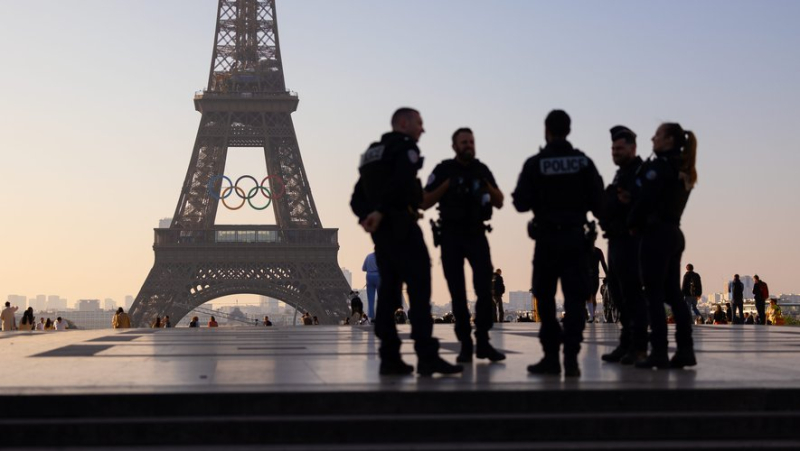Paris 2024 Olympic Games: Olympic Games: law enforcement in the starting blocks to meet an extraordinary security challenge

Pour sécuriser la cérémonie d’ouverture, 45 000 policiers et gendarmes sont mobilisés. MAXPPP – Alexis Sciard
À un mois de l’ouverture des Jeux olympiques (26 juillet-11 août), policiers, gendarmes, préfets et gouvernement affirment être prêts.
One month before the opening of the Olympic Games (July 26-August 11), police, gendarmes, prefects and government say they are ready to take up the security challenge of this global event in an unstable political situation which adds to a climate of international tensions and high terrorist threats.
"Everything is ready", "there’there will have no worries", Minister of the Interior Gérald Darmanin assured again on Europe 1 on Monday, to signify that the dissolution of the National Assembly, whatever’ Whatever the result, will have no impact on the organization of the Games. Police officers and gendarmes, interviewed by the AFP, nevertheless expect that the period will be conducive to more or less violent demonstrations in the event of a lack of majority.
"For, no one (from the camps) will be happy", summarizes a senior police officer. "There will be no conflagration of the suburbs" , Mr. Darmanin retorted on Monday, referring to an intelligence note. The real security challenge, gigantic if there ever was one, is first and foremost that of the opening ceremony, a vast river parade on the Seine in the heart of Paris. Never has an opening ceremony taken place outside of a stadium.
"Trouble magnet"
"The Games are a magnet for annoyances. They offer opportunities" to those who want to take advantage of them in terms "of’interference, cyber, terrorism", recently noted a security source. To secure the opening ceremony, 45,000 police and gendarmes are mobilized.
The audience size has been revised downwards but remains substantial with 326,000 spectators on the platforms: 104,000 paying seats on the lower platforms, 222,000 paying seats on the lower platforms, 000 free places on the high platforms, not counting around 200,000 people from the buildings overlooking the Seine and 50,000 in the Parisian fanzones.
For the first time, the elite units of the police and gendarmerie (200 from the Raid, 350 from the GIGN and 100 from the BRI) will work together. Some 18,000 to 22,000 private security agents will also be employed at these Games, and 18,000 military personnel can also be mobilized if necessary.
The Ministry of the Armed Forces will oversee the fight against drones. The airspace will be completely closed within a radius of 150 kilometers around Paris, from 7 p.m. to midnight, the day of the opening ceremony, which is never arrived. All those participating in the Games will have previously been "screened" by the services.
The objective of one million security investigations is very close to being achieved, according to the Ministry of the Interior. The Olympic and then Paralympic Games (August 28-September 8) will take place in a context of high terrorist threat in France, where the Vigipirate plan has already been brought to its maximum level since March 24 and the attack on Crocus City Hall in Moscow, claimed by the jihadist group Islamic State.
At this stage, "no" particular threat weighs on the Olympics as the authorities repeat, but overall, it is "very high", the security source recently explained. The "international context does nothing to attenuate it, on the contrary", she added, citing the war in Ukraine and that in Gaza . The threat "endogenous" or "internal" remains the main one, as evidenced by the latest attacks committed in Arras (north) in October 2023, then at the foot of the Eiffel Tower in December. As well as the indictment at the end of May of a young 18-year-old Chechen for having planned an Islamist-inspired attack targeting the Olympic football events in Saint-Étienne.
Cyber threats
Among the points of attention of the authorities, throughout the period of the Games, that of the "massive flow of visitors among whom could be malicious people& ;quot;, according to the security source. To help services, Algorithmic Video Surveillance (VSA) will be tested. But no question, the authorities promise, of using software using facial recognition, although it is already used in France in certain cases and under conditions.
Another risk, that of manipulation and informational interference with people seeking to "deal reputational blows by raising micro incidents", they say within the intelligence services. Latest recent examples: the affair of the red hands tagged on the Wall of the Righteous or even that of the coffins on the walls of Paris. Cyber threats will be very significant.
The authorities expect an exponential progression of these compared to the Tokyo Summer Games in 2021. More than 450 million attacks had been recorded by the Japanese. They could be, according to Anssi (authority dedicated to the security of information systems) "eight to ten times higher".




